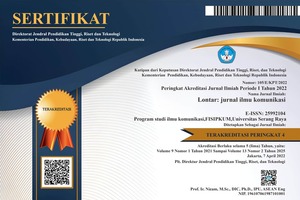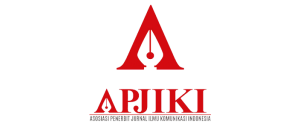President Prabowo's Political Communication on Environmental Issues in Constructing Climate Narrative
DOI:
https://doi.org/10.30656/lontar.v13.i1.10322Keywords:
political communication , environmental issues, framing theory, media, climate changeAbstract
President Prabowo Subianto officially won presidential election in 2024 and began his administration effectively in October. He had some plans and policies to support national development, including food security and the expansion of palm oil plantation. These sectors are against ecosystem conservation and climate change prevention so that the issue became a controversy among the people. Through his official speech, President Prabowo did not mention environmental issue, whereas he put other sectors as top priorities. Media caught the event and and public paid attention as well. This research aims to analyze the framing on President Prabowo's political communication regarding environmental issue. The analysis was conducted with framing theory of Robert N. Entman including his four main components, define problems, diagnose causes, moral judgement, and treatment recommendation. Two media which were observed by the researcher are Tempo.co and Betahita.id with qualitative approach. Researcher also applied Agenda Setting theory with critical discourse approach to see how media perceive the President in addressing the weakness in governance and lacking of relevant knowledge. Meanwhile, Betahita.id assessed that President Prabowo's narrative on environmental issue is a form of his carelessness towards human rights issues and his partiality with irresponsible corporations.
References
Abbass, K., Qasim, M. Z., Song, H., Murshed, M., Mahmood, H., & Younis, I. (2022). A review of the global climate change impacts, adaptation, and sustainable mitigation measures. In Environmental Science and Pollution Research (Vol. 29, Issue 28, pp. 42539–42559). Springer Science and Business Media Deutschland GmbH. https://doi.org/10.1007/s11356-022-19718-6
Anggoro, A. D., Puspitasari, F. A., & Som, A. P. M. (2023). Robert Entman’s Framing Analysis: Female Representation in 2024 Presidential Candidates on Republika.com and Sindonews.com. Komunikator, 15(2), 211–224. https://doi.org/10.18196/jkm.19247
Bumbuc, Ş. (2016). About Subjectivity in Qualitative Data Interpretation. International Conference KNOWLEDGE-BASED ORGANIZATION, 22(2), 419–424. https://doi.org/10.1515/kbo-2016-0072
Ekonomi, B., PEMBANGUNAN Pusat Analisis Keparlemenan Pusat Analisis Keparlemenan Badan Keahlian DPR Badan Keahlian DPR RI Gd Nusantara I Lt, D. R., Nusantara Lt, G. I., Jend Gatot Subroto Jl Jend Gatot Subroto, J., & Meilani, H. (n.d.). TANTANGAN PENSIUN DINI PEMBANGKIT LISTRIK TENAGA UAP.
Entman, R. M. (1993). Framing: Toward Clarification of a Fractured Paradigm. In Journal of Communication (Vol. 43, Issue 4).
Fitra Yuza, A., & Abdul Manaf, H. (n.d.). CosmoGov : Jurnal Ilmu Pemerintahan DEFORESTATION POLICY GOVERNANCE IN INDONESIA. 9(1), 2023. https://doi.org/10.24198/cosmogov.v9i1.44778
Hafidli, M. N., Nur, R., Lestari Sasmita, D., Nurazhari, L., Rahisa, N., & Putri, G. (2023). ANALISIS FRAMING MODEL ROBERT ENTMAN TENTANG KASUS KANJURUHAN DI DETIKCOM DAN BBC NEWS. In JIS: Jurnal Ilmu Sosial (Vol. 3, Issue 1).
Hata Poda, J., Pendri, A., Rahma Nesti, M., Wahyudi, M., & Risalah Sumatera Barat, A. (2024). Prabowo Subianto’s Representation in the 2019 Presidential Election and 2024 Presidential Election in Mojokdotco Posts on Instagram: Multimodal Discourse Analysis. 03(01), 2964–6928. https://jurnal.uinsyahada.ac.id/index.php/
Herningtyas, W. (2021). Conflict of Palm Oil Companies with Indigenous People and Forest Surrounding Society. BHUMI: Jurnal Agraria Dan Pertanahan, 7(2), 199–209. https://doi.org/10.31292/bhumi.v7i2.504
ID-CREAs-response-to-COP29-G20-Summit-commitments-1-1. (n.d.).
Jolanda Olivia, F., & Setiawan, H. (n.d.). Analisis Framing Model Robert N Entman Tentang Penerapan Kembali Tilang Manual Jakarta di Kompas.com dan Tempo.com. Jurnal Ilmiah Wahana Pendidikan, Mei, 2023(9), 492–498. https://doi.org/10.5281/zenodo.7969063
Mandarani, V., & Fedianto, N. (2020, February 26). The Ideological Analysis of The Guardian News about The Moving of Indonesian Capital City. https://doi.org/10.4108/eai.12-10-2019.2292189
Ramli, R. N. H., Annisa, A. N., & Hakim, M. Z. (2023). Biodiversity protection and preservation: the roles of legal governance in Indonesia. IOP Conference Series: Earth and Environmental Science, 1277(1). https://doi.org/10.1088/1755-1315/1277/1/012008
Rigas, N., & Kounetas, K. E. (2024). The impact of CO2 emissions and climate on economic growth and productivity: International evidence. Review of Development Economics, 28(2), 719–740. https://doi.org/10.1111/rode.13075
Rosairo, H. S. R. (2023). Thematic analysis in qualitative research. In Journal of Agricultural Sciences - Sri Lanka (Vol. 18, Issue 3). Faculty of Agricultural Sciences, Sabaragamuwa University of Sri Lanka. https://doi.org/10.4038/JAS.V18I3.10526
Rosaprana, W., Kuncahyo, B., & Puspaningsih, N. (2023). Carbon Stock Estimation on Oil Palm Plantations and Oil Palm-Based Agroforestry in Gunung Mas Regency. Media Konservasi, 28(3), 253–261. https://doi.org/10.29244/medkon.28.3.253-261
Siraj, H.-. (2019). Indonesian Policy in Ratifying The 2015 Paris Agreement. Global: Jurnal Politik Internasional, 21(1), 70. https://doi.org/10.7454/global.v21i1.353
Srinivasan, M., & Barclay, F. (2017). Media credibility: A triangulation test. https://www.researchgate.net/publication/329910539
Tambusai, J. P., Efendi, E., Taufiqurrohman, A., Supriadi, T., Kuswananda, E., & Islam, K. P. (n.d.). Teori Agenda Setting.
Teun-A.-van-Dijk-2015-Critical-discourse-Analysis. (n.d.).
Wibowo, F., & Mugni, E. A. (n.d.). VIRTU: JURNAL KAJIAN KOMUNIKASI, BUDAYA DAN ISLAM ANALISIS FRAMING ROBERT ENTMANT DALAM DETIK.COM DAN RADARBOGOR.ID TENTANG BERITA KECURANGAN PPDB SISTEM ZONASI DI KOTA BOGOR. https://doi.org/10.15408/virtu.vxxx.xxxxx
Downloads
Published
Issue
Section
License
Copyright (c) 2025 LONTAR: Jurnal Ilmu Komunikasi

This work is licensed under a Creative Commons Attribution 4.0 International License.
By submitting an article to the journal, the author(s) agree to transfer the published article's copyright to the journal, which will act as the publisher. This means the journal will have the right to publish the article in various forms, including reprints. The journal will maintain the publishing rights to the published articles.
In line with the license, authors and third parties (readers, researchers, and others) are allowed to share and adapt the material. In addition, the material must be given appropriate credit, provided with a link to the license, and indicated if changes were made. If authors remix, transform, or build upon the material, authors must distribute their contributions under the same license as the original.





